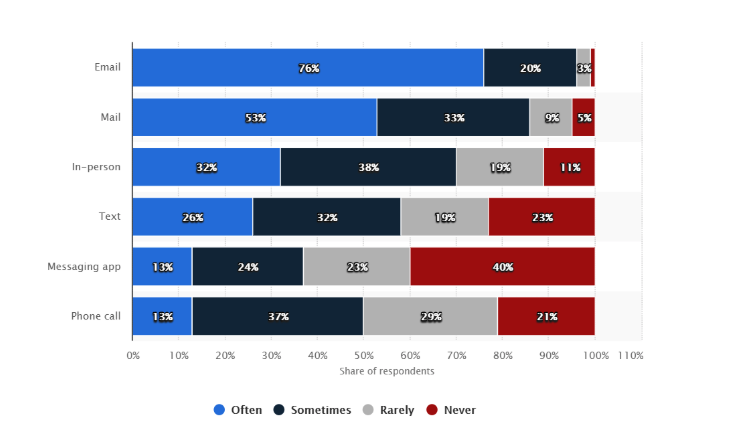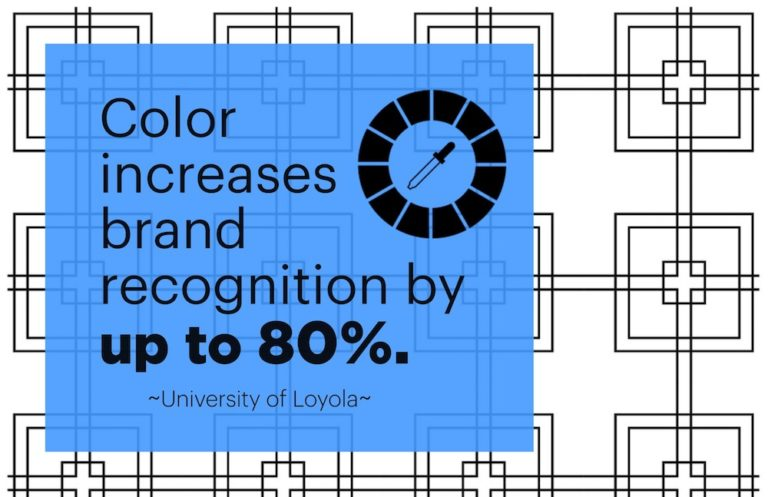Tips For Successful Email Marketing Campaigns For Universities
Posted on: December 29th, 2019
According to a recent survey, nearly 68 percent of teens and 73 percent of Millennials said they prefer to receive communication from a business via email. With email being such a prominent channel of communication, it is essential for universities to utilize them to their full potential. Not just for reaching out and communicating, emails can prove to be a great tool for the branding of your university.
According to Statista, in 2018, 76% of high school students preferred getting emails from universities in their university research phase. This distinctly outranks phone calls, phone messages, social media outreach, and in-person seminars.

Stats
Here are a few things you need to keep in mind to build the beginning of your email campaigns to reach out to your students and prospects.
Use an Email Service Provider
An Email Service Provider is a service organization that provides transactional and/or marketing email services. Here are some things you should look out for before choosing an ESP.
1. It should provide you with a subaccount feature for managing various departments under the single university account.
2. Cost-effective email sending includes a pricing plan which allows you to send a large volume of emails easily.
3. The ESP should be able to provide you with great email deliverability rates so that your emails reach your students’ inboxes and not the spam folder.
4. It should be able to able to provide you with API integration libraries in the language you require and provide good documentation and assistance.
ESPs like Pepipost can help you get integrated and sending emails quickly. They have great delivery rates, and you can save almost up to 50% of your cost compared to other providers in the market.
Keep your department wise emails in sync.
As mentioned before, with a large number of emails every department will be sending, it is essential that they are kept separate, and the departments have limited access.
If you do create a master account and manage email accounts for different departments, you can assign a different API Key to each department (or even 2 API Keys to each department if they send both marketing & transactional emails).
Should an issue arise with one department’s mailings (a rate limit or sending is temporarily blocked due to abuse complaints), it will only impact their one API Key, and not your entire school’s emailing.
A university’s marketing or communications department can own the master account, and using sub-accounts and API keys, they can create separate accounts for different departments, sending needs, purposes, and users. You could have the Science department on one sub-account, the alumni relations team on another, student recruitment on another, and so forth.
Segment your contact list
You can segment your email list by creating various groups based on the students who have qualities that fit best for your department. Make sure you use an email list validation tool to make sure your list does not have email IDs, which could end up hurting your IP reputation.
Segmentation can be done based on your student’s demographics, and you can target the best possible candidates by creating separate, personalised campaigns for these candidates.
This is a tactic that has been proven to be greatly effective for getting amazing open and click through rates from your emails.
Some of the immediate advantages of segmenting your lists are:
1. Increases open rates.
2. Improves click-through and engagement rates for the target audience.
3. Greatly increases the probability of conversions/ROI for your university brand.
4. Increases your domain reputation and hygiene as the intended users get relevant emails.
5. You can creatively target the students with a variety of courses you offer, which are highly relevant to them.
Use simple but effective templates
Ensure brand consistency across all emails by using locked sections and bulk template editing. For example, you could create a footer with your logo, social media links, and a recent headline, and lock this section so that no other user can come in and edit the logo, the colours, or the content. You can do the same for the header section, or even content blocks throughout the email. This ensures that no matter what department your email comes from, the end-user will have a consistent experience with your brand.

stats 2
Without consistency, your brand is everything and nothing at the same time. With consistency, you are one brand, one identity. Which brand do you think wins out in the end?
Don’t forget to mobile-optimize your emails.
If there’s one thing you’ve been told too many times as a marketer for a university, it’s that students are on mobile devices more than desktops (or laptops, or really anything else in this world).
Today, more than 70% of readers will delete an email that is not optimized for mobile. Meanwhile, over 25% of emails are first to read on a mobile device. This number jumps to 40% for people aged 14-18; in other words, your prospective students.
You’ve done so well to capture a user’s email, design a campaign, optimize your deliverability to land in the inbox, don’t lose them because you didn’t optimize for mobile.
Conclusion
It’s no secret how important email marketing is to universities, from recruitment and fundraising to simply communicating campus activities. As a marketer in universities, you already understand this, however hopefully this article outlined some of the often overlooked aspects of email marketing in universities.
Namely – how to optimize your email platform, create efficiencies by managing all emails under one platform, maintain control of your brand across departments, and of course, how to design and code responsive emails.
NOW
- Customer support 24/7
- 100% satisfaction guaranteed
- 100% confidentiality
- On-time help provided
- Contact directly to helper
- Unique ideas and thoughts

NOW
Let us Gladly
Assist you...!!
NOW
- IoT & Digital Signage Transformation
- Why Social Activities Are Beneficial In University
- How Videos Are Revolutionizing SEO Globally
- School-wide Strategies for Promoting Love of Reading
- Starter’s Guide To Analyze Variation Between Transactional And Promotional SMS
- Role Of IT In Education
- Steps To The Perfect College List
- Influencer Marketing: Up Your Game in Digital Marketing In 2020
- Self-Esteem Building Activities for University Students
- Image Optimization for the Web- Increasing Speed and UX
Disclaimer: We provide services for reference and assistance purpose. We are strictly bound to rule of not providing our work as finalised but you can take assistance from it.
Copyrights © 2026. All rights reserved by MHR Writer


